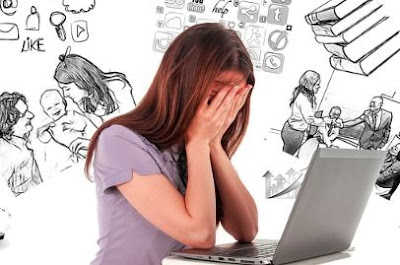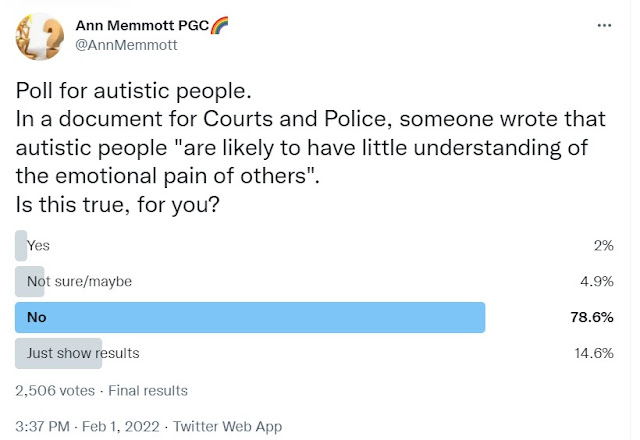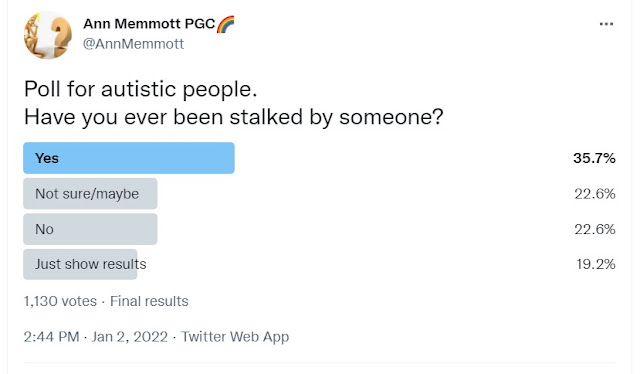"Achieving best evidence in Criminal Proceedings: Guidance on Interviewing Victims and Witnesses, and Guidance on Using Special Measures".
In it, a stark and concerning misdescription of autistic people, in my view: (page 38).
"...witnesses with autistic spectrum disorder..are likely to have little understanding of the emotional pain or problems of others..."
Certainly, in the 1940s, that was one of the original misunderstandings about autistic people.
Let's look at an up to date informal poll result, asking autistic people if they felt this was true, for them.
There were more than 2500 people interacting with the poll. Some just wanted to see the results. That leaves us with just over 2000 autistic people giving answers.
50 of those said yes, they felt they had little understanding of the emotional pain of others.
1,970 autistic people said no, this was not true, for them.
I'll repeat that: 1,970 autistic people responding to this informal Twitter poll said no, it is not true that they have little to no understanding of the emotional pain of others.
If this poll isn't good enough evidence to question that statement, I would direct people to endless personal accounts visible online. Endless blogs. Endless books authored by autistic people. Endless online videos. We can have all manner of academic debates about whether an informal Twitter poll is reflective of the wider autistic population. That's not the point, here, though. The point is, if that statement in that criminal justice paper is true, how on earth did we end up with this poll result? Twitter isn't a hidden backwater. It's a public social media platform.
For decade after painful decade, autistic people's actual voices and lives haven't been relevant. Instead of asking autistic people, we've delved into ancient texts, as if we are following some ancient religion instead of dealing with real live people, right in front of us. And it concerns me greatly.
What else concerns me? The number of autistic victims of crime. Here's another informal Twitter poll.
"Poll for autistic people. Have you ever been stalked by someone?".
The majority responding said yes. Big numbers responding again.
We can have another academic debate about whether the percentages reflect the whole autistic population. Or we can take a step back, sit on our egos, and say, "Oh heck, there are hundreds of autistic people who have been victims of stalking and We Had No Idea Until Now." We hadn't even been asking these questions. Across the world, millions of autistic people who are victims of crime, and we know almost nothing about them.
I'd like us to reflect carefully on the message we're giving to Courts and others in the Criminal Justice System here in the UK: That autistic people can't feel the pain of others? Do we think this is how we achieve justice for autistic people?
I would suggest that telling Judges, Juries and Magistrates that we probably can't feel the pain of others is likely to prejudice the quest for justice for us. It's simply untrue in most instances, and it's extraordinary to find it in a brand new document for something this important. Autistic people usually feel deeply. We usually hurt deeply. We usually care deeply. Exceptions will apply, as is the case for all humans on the planet. No Criminal Justice proceeding should start with the untrue premise that the marginalised group are generally unfeeling. Would it have potential to lead a Jury, for example, to believe the crime against us wasn't that serious, as we can't feel much anyway? One can only hope not. But, why say something like this at all?
May I strongly recommend that, when we are writing documents about marginalised people, we include a good number of representatives of different groups in those communities, a good number of academics & others with expertise from those communities, and we get it right?
This isn't the mid 1940s any more, and we cannot simply keep repeating old myths at new audiences. Autistic lives are as precious, as fully worthwhile, as the lives of everyone else. Justice is already out of reach of most. Goodness me, as a victim of crime myself, such a statement portraying me as an unfeeling entity would put me off approaching Police or a Court at all. It's dreadful.
Autistic people deserve our respect, our accuracy, and our humility in listening to them. Autistic individuals are fully worthwhile people who usually feel deeply for others, are usually victims of crime, and are too often forced to live appalling lives littered with horrifying myths from the past.
Let's do better than this, please.
Thank you for reading.


